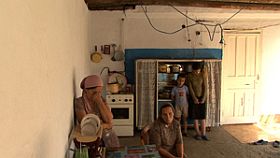


Mantas Kvedaravicius: Barzakh

At the Summer Media Studio in Neringa Lithuania, a European Film Student Workshop, that goes on until July 17, with editing as the theme, ending up with 10 short documentaries, it was very appropiate to show the awarded Lithuanian documentary from Chechnya, ”Barzakh”. Lithuania, small country with around 3 million inhabitants, has a tradition for making films that have been characterised as ”poetic realism”, with Arunas Matelis and Audrius Stonys as well known names in the international documentary circle. The film by Mantas Kvedaravicius is no exception from that label, and after two very well deserved awards at the Berlinale, ”Barzakh” is now travelling the world of festivals.
Stasys Baltakis, teacher at the Lithuanian Academy of Music and Theatre, the film school of the Country, introduced the film and its director. ”He is not a film director, he is a thinker”, he said about the debutant Kvedaravicius, who made the film over a period of years, now completing his PhD (and a book) on the affects of pain. And the film is about pain, about people in Chechnya, families whose members disappear or have undergone torture. Shot illegally, and with one year in the editing, the film expresses pure love and respect for the characters without turning to sentimentalism. ”Our life stands still” says the mother of Hamdan, who disappeared 6 years ago without any sign given to the family, and with loads of papers written to the authorities with no result. In a very slow and tense rythm the film makes the audience experience how life goes on. It has to. The camera catches magical moments inside the houses, the characters tell their stories of pain and torture, mainly off the picture, car trips give the narrative a flow and information about how a devastated city looks, at the same time as the Russian authorities have done a lot to lighten up mosques and other buildings. Pure facade for the invisible violence, it seems. While watching the film you sense a growing anger and sadness witnessing the life of people, who wait and hope.
Barzakh is a metaphor used in the film visually. This is how the director – on the film’s website – describes the phenomenon: Barzakh is a theological concept that comes from the Quran and has been elaborated by Sufi scholars. It loosely defines, through the metaphor of water, the space between life and death. At the same time the term is not merely a metaphor, but rather a paradigm on which the film is built. That is, it does not simply indicate that life in Chechnya is like Barzakh, or that because of its relation to Sufism, which is the predominant religious practice in Chechnya, it is a widely used local concept. Rather its main purpose is as a guiding principle, to distinguish the peculiarities of life there and to show how they link together and connect us into other spaces and temporalities.
Lithuania, 2011, 57 mins. PS. The film has, as many other important documentaries in these years, been supported by the Finns, the company of Aki Kaurismäki and YLE and Finnish Film Foundation.